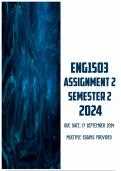, PLEASE USE THIS DOCUMENT AS A GUIDE TO ANSWER YOUR ASSIGNMENT
Please note that the author of this document will not responsibility for any plagiarizing you
commit.
Read the extract below and answer the question that follows.
Text A
According to Lotto (2020), “…history tells us that financial institutions are quite myopic in their
lending behavior—they will tend to be quite liberal with credit when the economic times are good,
only to repent of their generosity and tighten lending standards when times turn bad. This
‘procyclicality’ in lending behavior can spell danger for over-leveraged borrowers and, by
extension, for the financial institutions themselves, especially if the economic downturn is sharp
or prolonged…”
Adapted from: Lotto, J. (2020). Understanding sociodemographic factors influencing households’
financial literacy in Tanzania. Cogent Economics & Finance, 8:1, 1792152, DOI:
10.1080/23322039.2020.1792152
Instruction
In this question, you are expected to write an essay of 500 words in length. Your essay should
demonstrate the conventions you have learned from the module about essay structure and layout. This
includes forming a thesis statement, clarity of message, taking a clear position and stance, using the
appropriate words for the type of essay; cohesion and logical organisation of information, proper
paragraphing, correct sentence structure and referencing.
1. Using Text A as your starting point, do you think that incorporating financial literacy as a
subject in schools will enable individuals to make better financial decisions? You have to take a
stance and provide reasons for your stance.
Essay 1
Argumentative Essay: Should Financial Literacy be Incorporated as a Subject in Schools?
Financial literacy is increasingly recognized as a crucial life skill that empowers individuals to make
informed and effective decisions regarding their financial resources. In considering whether financial
literacy should be incorporated as a subject in schools, I argue that doing so will indeed enable
individuals to make better financial decisions. This argument is supported by insights drawn from the
provided sources, which highlight the importance of financial literacy in mitigating risks associated
with economic downturns, enhancing retirement planning, and addressing social and economic
inequalities.
The Role of Financial Literacy in Economic Decision-Making
Text A highlights the volatility of financial institutions' lending behavior, which often fluctuates with
economic conditions. During economic booms, these institutions tend to offer generous credit, but
they retract this liberality during downturns, leading to potential financial crises for over-leveraged
borrowers (Lotto, 2020, p. 5). In this context, financial literacy becomes essential for individuals to
understand the risks associated with credit and debt. By incorporating financial literacy as a subject
in schools, students would learn to recognize the cyclical nature of economic conditions and make
prudent borrowing decisions to avoid becoming over-leveraged.




